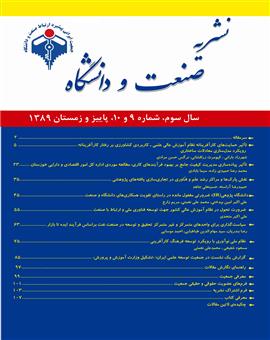دانشگاه پژوهی (IR)؛ ضرورتی مغفول مانده در راستای تقویت همکاریهای دانشگاه و صنعت
محورهای موضوعی :مریم زارع 1 , محمدعلی نعمتی 2 , 3
1 - دانشگاه سمنان
2 - گروه مدیریت آموزش عالی، دانشکده روان شناسی وعلوم تربیتی، دانشگاه علامه طباطبایی، تهران، ایران
3 -
کلید واژه: آموزش عالی, دانشگاه, صنعت, دانشگاه پژوهی, الزامات درون و برون دانشگاهی,
چکیده مقاله :
امروزه با توجه به روند شتابان افزایش هزینههای آموزش عالی و کیفیت آن و کاهش حمایتهای دولتی از دانشگاهها و مراکز آموزش عالی در سراسر جهان از یک سو و شتابگیری پیشرفت تکنولوژی و گسترش نیاز سیستم اقتصادی به دانش علمی از سوی دیگر، سیستم آکادمیک به صنعت دانش تبدیل شده است. افزایش بهرهوری در دانشگاهها تابع فرايند تحقیق و توسعه است که در مبانی نظری، دانشگاه پژوهی نامیده میشود. در دهههای اخیر، مهمترین مسأله اقتصاد ایران پایین بودن سرمایهگذاری در توسعه دانش و بهرهوری آن است. دانشگاههای ایران مطلوب است خود یادگیرنده و دانش محور شوند. دانشگاه پژوهی مناسبترین مسير دستيابی دانشگاههای کشور به این هدف است. واحد دانشگاه پژوهی در اغلب دانشگاههای معتبر جهان، به منظور تقویت همکاریهای دانشگاه و صنعت، پيدايش و نضج یافته است؛ در حالیکه در دانشگاههای کشور، امری مغفول مانده است. در این پژوهش تلاش میشود ضمن تبیین مفهوم دانشگاه پژوهی، الزامات تحقق آن از طریق مطالعه مبانی نظری تحقیق شناسایی شود و سپس از طریق روش دلفی نظرات متخصصان، محققان و خبرگان این حوزه در رابطه با الزامات شناسایی شده فوق مورد بررسی قرار گیرد
Today, the rapid increase in the cost of higher education and its quality and reduced public support for universities and higher educational institutions around the world on the one hand and rapid technological advances and the needs of economic systems for scientific knowledge ,on the other hand, academic system is converted into knowledge industry.. Increased productivity at universities is dependent upon the amount of research and development done which in terms of theoretical principles is called institutional research. In recent decades, the most important Iran’s economic problem has been low investment in the creation of knowledge and promotion of productivity. It is desirable for Iran’s universities to become knowledge based. So IR is the most suitable approach to achieve this goal. While the unit of Institutional Research of the world's most prestigious universities is created to strengthen university-industry collaboration, , it has been neglected in Iran’s universities. This research attempts to explain the concept of IR and identify the methods which can be implemented through the study of theoretical principles and Delphi technique.
1. انتظاری، یعقوب، تحقیقات نهادی رهیافتی برای بهبود بهرهوری توسعه دانش در دانشگاههای ایران، نامه آموزش عالی، شماره 1، 2، 3 و 4، 1383.
2. عظیمی طالقانی، فرهاد، اقتصاد دانش مدار، تدبیر شماره 122، ص70 ـ 71، 1381.
3. فراستخواه، مقصود، دانشگاه وآموزش عالی؛ منظرهای جهانی و مسئلههای ایرانی، تهران، نشرنی، 1388.
4. مجلس شورای اسلامی، قانون اهداف، وظایف و تشکیلات وزارت علوم، تحقیقات و تکنولوژی تهران: دفتر رئیس مجلس شورای اسلامی، 1383.
5. Bagshaw, M. (1999) "Teaching Institutional Research to the Learning ـ Inhibited Institution". New Direction for IR. NO. 104. 73 ـ 82, US: Jossey ـ Bass Publishers.
6. Boer, Harry (2005) "principles of good governance: the case of the Netherlands" Available at: www. skve. it/files/cheps/principlesgovernance _de_Boer. ppt
7. Brown, Jenifer. A. (2008) "Institutional Research and External Reporting: The Major Data Seekers" New Direction for Higher Education, No. 141.
8. Chambers, Stephen, Louise Greek, Mary (2007) "IR Application: Using Advanced Tools, Techniques, and Methodologies", IR Activities, AIR, Vol. 12.
9. Huynh, Bao & Gibbons, Mary France, (2009) “Increasing Demands and Changing Institutional Research Roles: How Technology can help” No. 143.
10. Knight, William E. (2010) "In Their Own Words: Effectiveness in Institutional Research" Association for Institutional Research, No. 115.
11. OECD (1996) “Measuring what People Know: Human Capital Accounting for the Knowledge” OECD.
12. Olsen, Deborah (2000) "Institutional Research". New Directions for IR, NO. 111, Jossey ـ Bass. A Wiley Company.
13. Serban, A. M. (2002) “Knowledge Management; The 5th Face of Institutional Research US” Wiley Periodicals Inc.
14. Terenzini, Patrick. (1999) "On the Nature of Institutional Research and Knowledge and Skills it Requires". New Directions for IR, NO. 104, US: Jossey ـ Bass, publishers.
15. University of Hong Kong (2003) “Executive Summary” Available at:
www. hku. hk/notice/20030207/final_report. pdf
16. Volkwein, J. Fredericks, (2008) “The Foundations and Evolution of Institutional Research”, No. 141.
W. Matier, Michael, Sidle, C. Clinton, J. Hurst, Peter, (1994) “How it Ought to Be: Institutional Researches’ Roles as We Approach the 21st Century”, ERIC


